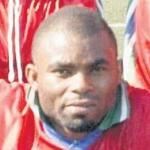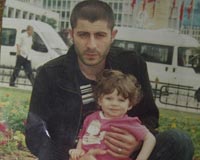The Beyoglu 7th Court of First Instance has decreed that there is a possibility of "intentional killing" in the case of the death of Nigerian refugee Festus Okey, who died while in detention at the Beyoglu Police Station in central Istanbul. The case has thus been sent to the Beyoglu Heavy Penal Court.
Initially, police officer Cengiz Yildiz was accused of accidentally killing a person, but after the hearing yesterday (26 November), the prosecutor demanded that Yildiz be charged with "intentional killing" and that the case be sent to a heavy penal court.
Okey's family not involved, CHD seeks to join case
The court of first instance had refused the demand of the Modern Lawyers' Association (CHD) to join the case as joint plaintiffs. Serhan Arikanoglu, the CHD Istanbul branch president, told bianet that the association would repeat its demand at the heavy penal court.
Members of the CHD Istanbul have previously made statements on the suspicious nature of Okey's death and the investigation into the death.
Okey's family, which lives in Nigeria, will not be represented, as they have not asked for representation and the Nigerian Consulate has not acted either. Should the CHD not be allowed to join the case, this would mean that only the prosecutor and the judge would be allowed to crossexamine the defendant and witnesses in order to clear up the contradictions currently existing.
Yildiz claims innocence
Bianet was told by lawyers and rights activists attending the hearing what Yildiz said in his defense at the hearing yesterday. Yildiz said that because he worked in a "difficult area" of Istanbul, he carried his gun not in its holster, but in his belt, and that, for the same reason, the bullet was ready in the gun barrel.
He claimed that when he and Festus Okey were alone in the room used for meetings with lawyrs, he realised that Okey was moving to take his gun, that he held the gun handle and Okey the barrel, and that a shot was fired during the scuffle.
Yildiz claimed that he kept his finger away from the trigger because he knew that the bullet was at the mouth of the barrel. When the judge asked how a shot could then be fired, Yildiz was unable to explain.
No gunpowder traces were found on Okey's hand, which, Yildiz said, was possible with a "closed barrel". Asked about one of the most important pieces of evidence, Okey's shirt, which has disappeared, Yildiz said that it might have been cut up and thrown away during the operation in hospital.
Helsinki's Citizens' Charter monitoring case
Özlem Dalkiran, representative of the Refugee Support Programme of the Helsinki Citizens' Charter, said that the organisation would continue to monitor the trial. She expressed the hope that witnesses would speak at the trial and explained that active involvement of Okey's family would be very important.
"It is a positive step that the prosecutor has decided on intentional killing. This shows that the seriousness of the event has been understood better."
However, she was still realistic: "We hope that this does not mean that the case is put on the shelf. We have often seen that with decisions concerning security and spheres of jurisdiction, human rights violations cases have been drawn out."
Mavioglu:Highly suspicious circumstances
Journalist Ertugrul Mavioglu of the "Radikal" newspaper yesterday (26 November), drew attention to the lack of transparency in the case, drawing on information from the CHD.
- First of all, defendant Cengiz Yildiz was one of the police officers who prepared the report on the event he was involved in himself.
- Furthermore, this report was presented as evidence. It has also become clear that the prosecution was informed of the shooting three hours to late. The CHD, so Mavioglu, believes that three hours would be sufficient to get rid of evidence.
- The fact that there were no gunpowder traces found on Yildiz's hand can only be explained by him washing his hands. Allowing a suspect to wash his hands is a serious case of negligence.
- Furhtermore, the gun used in the incident, which was confiscated by the Criminal Court of First Instance, has been given back to the defendant. The police officer on trial has not been taken off duty and continues on full salary, with the gun back in his belt.
- It is suspicious that Okey was taken to the room reserved for meetings with lawyers rather than being searched in the lockup.
- One police officer, Mehmet Aldemir, said that he was not present, but saw the event on camera. However, no recordings of the incident are to be found. The police claimed that the computer coud not save images. However, images of Okey and the officers entering and leaving the station have been found. There is thus a great possibility that the images of the incident were later deleted.
- Although Okey's shirt is to be seen on the police recordings entering and leaving the police station and on the hospital camera when entering hospital, it has now disappeared. The police claims that it disappeared in hospital. The shirt represents an important piece of evidence which would have thrown light on the distance and angle of the shot. (TK/EM/AG)
















